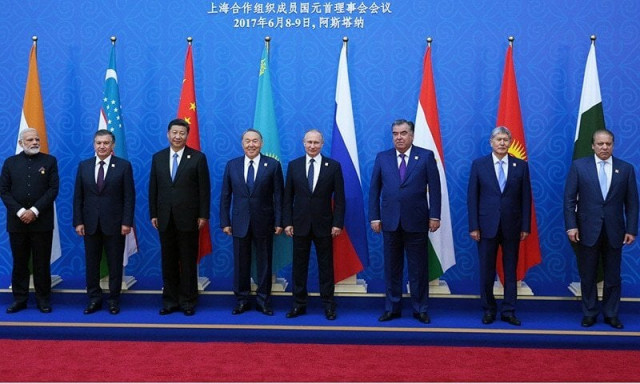Strategic implications of SCO
Pakistan would now be obliged to fully subscribe to the Charter of SCO

Pakistan would now be obliged to fully subscribe to the Charter of SCO. PHOTO: REUTERS
To understand the political, strategic and economic implications of this development for Pakistan and the immediate neighbourhood one would need to go through the Charter of the SCO with a fine toothcomb, especially the first two of the 26-article document.
The main goals and tasks of SCO according to Article 1 are: to jointly counteract terrorism, separatism and extremism in all their manifestations; to encourage the efficient regional cooperation in such spheres as politics, trade and economy, defence, etc; to cooperate in the prevention of international conflicts and in their peaceful settlement.
SCO member states shall adhere, according to Article 2, to the following principles: mutual respect of sovereignty, independence, territorial integrity of States and inviolability of State borders, non-aggression, non-interference in internal affairs, nonuse of force or threat of its use in international relations, seeking no unilateral military superiority in adjacent areas; peaceful settlement of disputes between the member States; implementation of obligations arising out of the present Charter and other documents adopted within the framework of SCO, in good faith.
In the preamble of the Charter it has been laid down that the members would agree to mutual reduction of armed forces in the border areas by way of strengthening confidence in the military field. This has already made an important contribution to the maintenance of peace, security and stability in the region and in the world. Peace-loving people of the region would certainly welcome the relevant provisions of the SCO Charter but hawks in India and Pakistan are more likely perhaps to find the first two Articles of the Charter too difficult to live with.
In June 2002, the heads of the SCO member states met in St Petersburg, Russia, to sign the SCO Charter which expounded on the organisation’s purposes, principles, structures and form of operation, and established it in international law.
Its six full members had accounted for 60% of the land mass of Eurasia and its population is a quarter of the world’s. With India and Pakistan joining, it now accounts for almost half of the world’s population. By 2007 the SCO had initiated over 20 large-scale projects related to transportation, energy and telecommunications and held regular meetings of security, military, defence, foreign affairs, economic, cultural, banking and other officials from its member states.
The SCO has established relations with the United Nations, where it is an observer in the General Assembly, the European Union, Association of Southeast Asian Nations (ASEAN), the Commonwealth of Independent States and the Organisation of Islamic Cooperation.
The Organisation is primarily centered on its member nation’s security-related concerns, often describing the main threats it confronts as being terrorism, separatism and extremism. However evidence is growing that its activities in the area of social development of its member states is increasing fast.
On 26 October 2005, during the Moscow summit of the SCO, the secretary general of the organisation said that the SCO will prioritise joint energy projects, the exploration of new hydrocarbon reserves, and joint use of water resources.
Pakistan has been an observer with SCO since 2005 and been actively participating in the activities of the organisation. Islamabad applied for full membership of the organisation in 2010.
The decision, in principle, to give membership to Pakistan was taken by the SCO heads of states meeting held in Ufa, Russia, in 2015.
The Heads of State Council is the highest decision-making body of SCO which meets annually. The last summit was held in Tashkent, Uzbekistan, in June, last year.
Pakistan would now be obliged to fully subscribe to the Charter of SCO. This would mean the well-known Pakistani hawks like Hafiz Saeed and Masood Azhar would hopefully be left with no choice but to abandon for good their misplaced jingoistic activities.
Published in The Express Tribune, June 10th, 2017.
Like Opinion & Editorial on Facebook, follow @ETOpEd on Twitter to receive all updates on all our daily pieces.














COMMENTS
Comments are moderated and generally will be posted if they are on-topic and not abusive.
For more information, please see our Comments FAQ